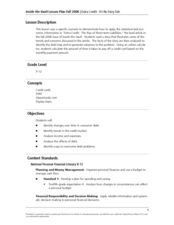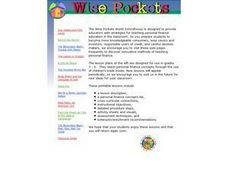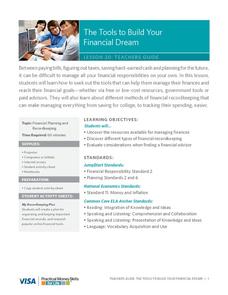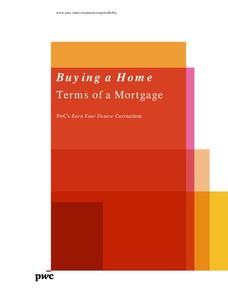Federal Reserve Bank
It's Your Paycheck
Beyond reading and arithmetic, one of the most important skills for graduating seniors to have is fiscal literacy and responsibility. Start them on the right financial track with nine lessons that focus on a variety of important...
Conneticut Department of Education
Personal Finance Project Resource Book
Balancing a budget, paying taxes, and buying a home may feel out of reach for your high schoolers, but in their adult years they will thank you for the early tips. A set of five lessons integrates applicable money math...
Curated OER
Money Management Part III: Savings Accounts and Cash vs. Credit
Help your class understand the importance of saving and managing their money. Here is part three to a unit on credit, cash, and savings. Learners discuss savings accounts and the idea that a budget plan can help them avoid costly credit...
Visa
Allowances and Spending Plans
Help youngsters understand how to manage small amounts of money by discussing an allowance and the difference between spending, saving, and giving.
Federal Reserve Bank
Keep the Currency
Each day, people throw currency away in different ways because of a lack of financial knowledge. Introduce your learners to the importance of financial literacy and assess their understanding of banking and personal finance.
Curated OER
Extra Credit: It’s No Fairy Tale
Students discuss their knowledge of payday loans and credit cards. In this Economics lesson, students complete a read an article and Q&A activity in groups, and play a vocabulary bingo game and a quiz game on payday loans. Students...
Federal Reserve Bank
To Rent-to-Own or Not to Rent-to-Own?
Explore the key elements of a contract with your young adults, and delve into the features and unique benefits of a rent-to-own contract through discussion and worksheet practice.
Practical Money Skills
Saving and Investing
Learn the difference between saving money and investing money, as well as the advantages and disadvantages of each. Kids review banking and personal finance terms before studying the different ways that people can reach their financial...
Curated OER
Wise Pockets
Using children's picture books and role-playing activities, youngsters begin to learn about personal finance management. These lesson plans are engaging and intend to endow pupils with skills for making wise decisions with money as they...
Visa
Financial Forces: Understanding Taxes and Inflation
Take the opportunity to offer your young adults some important financial wisdom on the way taxes and inflation will affect their lives in the future. Through discussion and review of different real-world scenarios provided...
Visa
The Tools to Build Your Financial Dream
When it comes to all the ways money management and financial responsibility weave into our daily lives as adults, make sure high schoolers are prepared to locate resources for managing their finances, such as a financial advisor.
Visa
Money Responsibility
Introduce young learners to the important life skill of responsibly managing money and recording how much they spend and save.
Wells Fargo
Hands on Banking
Cha-ching! You just hit the jackpot with this interactive consumer math unit. Supported by a series of online lessons and activities, these lessons engage students in applying their math skills to real-life personal...
Visa
Keeping Score: Why Credit Matters
How does one get credit, and who provides credit? What is a credit score, and how can an understanding of a credit score help you to make smart financial decisions? Through discussion and worksheets, class members will identify the...
PricewaterhouseCoopers
Consumer Fraud
Falling into the hands of a credit scam is much too common these days, and the young adults in the classroom need to be prepared. Through the activity, learners discover how to be a safe spender and use common sense when...
PricewaterhouseCoopers
Saving and Investing: Building Wealth for Financially-Secure Futures
While spending is fun, saving for a retirement is the future. Young adults learn about the importance of saving and different opportunities to do so during their adulthood.
EngageNY
TASC Transition Curriculum: Workshop 9
Here's a workshop for teachers that rocks the academic world! Using earthquakes as a medium for instruction, educators learn about crosscutting engineering with science. Fun, hands-on, collaborative exercises encourage participants to...
Visa
Making Spending Decisions
By role playing real-world experiences, such as purchasing snacks and grocery/toy store shopping, your youngsters will begin to develop an understanding of how to make decisions and choose between alternatives. This is the first...
Practical Money Skills
Buying a Home
Guide high schoolers through the process of buying a house with a simulation lesson. As pupils learn about mortgages, renting versus buying, and home inspections, they discuss ways to make informed financial decisions and sound...
Visa
Credit Cards
Choosing your first credit card can often be an intimidating and confusing experience for young adults. Give your pupils the foundational knowledge they need for tackling this process head-on, including learning to...
Visa
Buying a Home
What is the difference between buying and renting a home? Learners become more informed consumers and financially literate adults after developing foundational knowledge of the home-buying process.
Curated OER
ADULT ESOL LESSON PLAN--Concepts of Time and Money
Students identify different denominations of United States currency and symbols associated with money and reading prices. In addition, in pairs they identify examples of currency from newspapers and magazines.
PwC Financial Literacy
Buying a Home: Terms of a Mortgage
Buying a home, dealing with a lender, securing a mortgage; these are daunting tasks for many adults. Why not teach middle schoolers about this area of adulthood so they are better-prepared to make the leap into home ownership when they...
Curated OER
Budgeting for the Future
Eighth graders determine the net amount of an income for a fictional job. They must determine their net worth minus standard deductions. Students must then determine their monthly budget including, groceries, credit, and rent.























